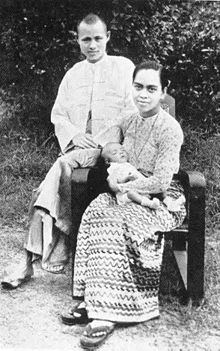Aung San Oo
This article needs to be updated. (July 2021) |
Aung San Oo | |
|---|---|
| အောင်ဆန်းဦး | |
| Born | 1943 (age 77–78) |
| Nationality | Burmese American |
| Occupation | Engineer |
| Spouse(s) | Lei Lei Nwe Thein |
| Parent(s) | Aung San Khin Kyi |
| Relatives | Aung San Suu Kyi (sister) Aung San Lin (brother) Aung San Chit (sister) Alexander Aris (nephew) Kim Aris (nephew) Ba Win (uncle) Sein Win (cousin) |

Aung San Oo (Burmese: အောင်ဆန်းဦး, born in 1943[1][2]) is a Burmese engineer who is the elder brother of politician and Nobel Peace Prize winner Aung San Suu Kyi; the two are the only surviving children of Burmese independence leader Aung San.
Aung San Oo has been described by the Burmese Lawyers' Council and the National Coalition Government of the Union of Burma as a potential surrogate of the junta in an attempt to humiliate Aung San Suu Kyi and place her in an untenable position.[3][4] Time magazine reports that, according to Burmese exiles and observers in Rangoon, the junta used the alleged surrogacy of Aung San Oo and his lawsuit as an act of spite against the National League for Democracy leader.[5]
Aung San Oo was educated in England and immigrated to the United States in 1973.[6] His wife, Lei Lei Nwe Thein (also spelled Leilei Nwe Thein), is also an American citizen.[7]
Litigation[]
Aung San Oo is estranged from his sister; while Suu Kyi became the leader of the Burmese National League for Democracy party, Oo is close to the ruling military junta. In 2000, Oo brought legal action against Suu Kyi in the Rangoon High Court demanding a half-share in the family home, where she had been held under intermittent house arrest from 1989 to 2010. There was widespread speculation at the time that Aung San Oo would then sell his half-share to the junta,[4] but the High Court ruled against Oo.[5] The Burmese Lawyers' Council describes the lawsuit as an attempt by the junta to publicly humiliate the leader of the National League for Democracy.[3] The Burmese Government in exile claims that had Aung San Oo won his case, he would have put Aung San Suu Kyi in an extremely precarious position.[4] In the Time article it is also reported that the junta may have used this legal manoeuver to "back Aung San Suu Kyi into a corner", despite advice to the contrary by the visiting former Japanese Prime Minister Ryutaro Hashimoto the year before the lawsuit.[5]
References[]
- ^ Pederson, Rena (15 January 2015). The Burma Spring. Pegasus Books. ISBN 9781605986678.
- ^ Sherman, Patrice (15 December 2017). Aung San Suu Kyi: Peaceful Resistance to the Burmese Military Junta. Cavendish Square Publishing. ISBN 9781502631107.
- ^ a b LEGAL ISSUES ON BURMA JOURNAL No. 7, DECEMBER 2000 BURMA LAWYERS' COUNCIL quote: "This approach reeks of a sinister attempt to publicly humiliate the leader of the National League for Democracy (NLD), which overwhelmingly won the one and only democratic general election conducted by the military junta."
- ^ a b c NCGUB Archived March 4, 2012, at the Wayback Machine quote: "If he wins the case, U Aung San Oo is expected to turn his share of the house over to the government, a result which would put Daw Aung San Suu Kyi in an extremely precarious position."
- ^ a b c TIME magazine, "Burmese Democracy Leader Faces New Threat", November 28, 2000 quote: "Talk about spite. First, Burma's military government told pro-democracy leader Aung San Suu Kyi that she couldn't leave Rangoon. Then they told her that she couldn't leave her house. Now, they want the house." and: "Late last year, former Japanese Prime Minister Ryutaro Hashimoto visited Burma and met with the generals. Burma's military is anxious for Japan to resume aid to their country, which it cut off when soldiers gunned down thousands of democracy demonstrators in 1988. Hashimoto gave the generals this advice when it came to dealing with Suu Kyi and her followers: Don't back her into a corner. The generals, it appears, aren't listening."
- ^ Hansen, Barbara (1 February 1996). "The Kitchen Ambassador : Leilei Nwe Thein shares the culture and cooking of Southern California's tiny Burmese community". Los Angeles Times. Retrieved 26 March 2012.
- ^ "Burmese-American Citizen returns from Homeland Merch Mission". ShelterboxUSA. 3 June 2008. Retrieved 26 March 2012.
- Burmese emigrants to the United States
- 1943 births
- Living people
- Engineers from California
- Burmese engineers
- People from San Diego
- Aung San Suu Kyi